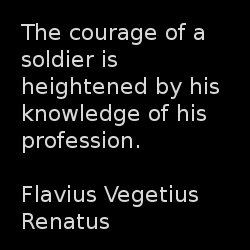Topic: Military Theory

Vegetius' General Maxims
The Military Institutions of the Romans, Flavius Vegetius Renatus, translated from the Latin by Lieutenant John Clark, Military Service Publishing Co. Edition, 1944
It is the nature of war that what is beneficial to you is detrimental to the enemy and what is of service to him hurts you. It is therefore a maxim never to do, or to omit doing anything as a consequence of his actions but to consult invariably your own interest only. And you depart from this interest whenever you imitate such measures as he pursues for his benefit. For the same reason it would he wrong for him to follow such steps as you take for your advantage .
The more your troops have been accustomed to camp duties on frontier stations and the more carefully they have been disciplined the less danger they will be exposed to in the field.
 Men must be sufficiently tried before they are led against the enemy.
Men must be sufficiently tried before they are led against the enemy.
It is much better to overcome the enemy by imposing upon him famine, surprise or terror than by general actions for in the latter instance fortune has often a greater share than valor.
Those designs are best of which the enemy are entirely ignorant till the moment of execution. Opportunity in war is often more to be depended on than courage.
To seduce the enemy's soldiers from their allegiance and encourage them to surrender is of especial service, for an adversary is more hurt by desertion than by slaughter.
It is better to have several bodies of reserves than to extend your front too much.
A general is not easily overcome who can form a true judgment of his own and the enemy's forces.
Valor is superior to numbers.
The nature of the ground is often of more consequence than courage.
Few men are born brave; many become so through training and force of discipline.
An army is strengthened by labor and enervated by idleness.
Troops are not to be led to battle unless confident of success.
Novelty and surprise throw an enemy into consternation, but common incidents have no effect.
He who rashly pursues a flying enemy with troops in disorder, seems bent upon throwing away that victory which he had before obtained.
An army unsupplied with grain and other necessary provisions risks being vanquished without striking a blow.
A general who trusts to his cavalry should choose the proper ground for them and employ them principally in the action.
He who depends on his infantry should choose a situation most proper for them and make full use of them.
When an enemy's spy lurks in the camp, order all your soldiers in the day time to their tents, and he will instantly be apprehended.
On finding that the enemy has notice of your designs, you must immediately alter your plan of operations.
Consult with many on proper measures to be taken, but communicate the plans you intend to put in execution to few, and those only of the most assured fidelity. Or better trust no one but yourself.
Punishment, and fear thereof, are necessary to keep soldiers in order in quarters; but in the field they are more influenced by hope and rewards.
Good officers never engage in general actions unless induced by opportunity or obliged by necessity.
To distress the enemy more by famine than the sword is a mark of consummate skill.
Many instructions might be given with regard to the cavalry. But as this branch of the service has been brought to perfection since the ancient writers and considerable improvements have been made in their drills and maneuvers, their arms, and the quality and management of their horses, nothing can be collected from those writers' works. Our present mode of discipline is sufficient.
Dispositions for action must be carefully concealed from the enemy, lest they should counteract them and defeat your plans by proper expedients. Lest the soldiers in the confusion of battle should be separated from their comrades, every cohort had its shields painted in a manner peculiar to itself. The name of each soldier was also written on the shield, together with the number of the cohort and century to which he belonged.

